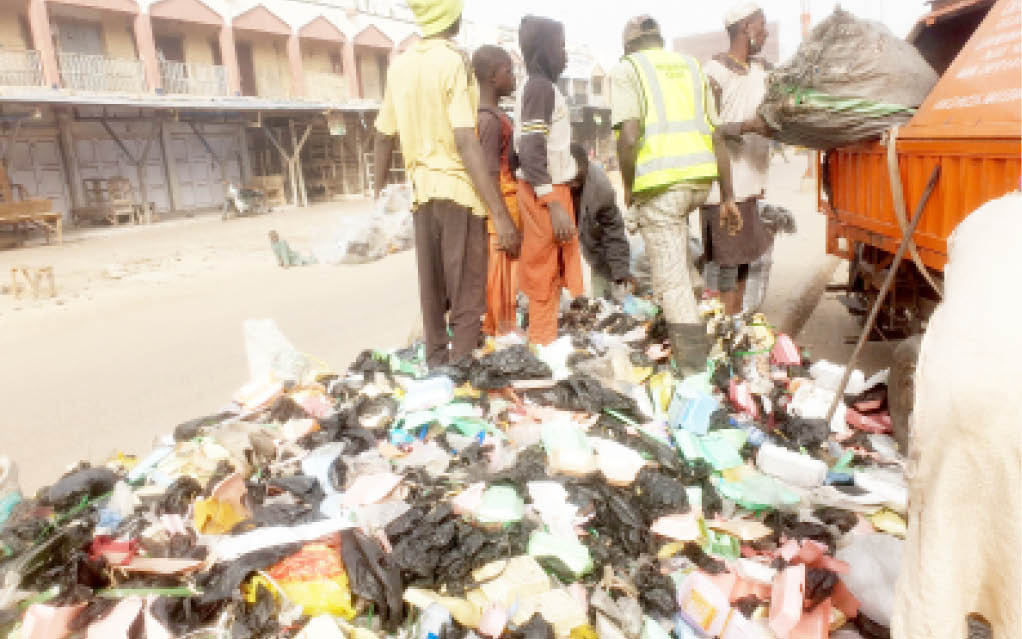As the climate change crisis worsens in Nigeria, scavengers, who are largely scorned by society; and recyclers, are doing their bit to contribute to climate solutions.
The scavengers, who are mostly teenagers, go round Kano city, scouring refuse dumps, gutters; and moving from house to house, among other places picking up plastics and other items.
They take the waste to middlemen who own collection spots where the waste is placed on scales and paid for based on the kilos it weighed. The middlemen then sell the selected waste to companies which recycle them.
Daily Trust gathered that among the items scavenged by the teenage boys are soft drink plastic bottles, sachet water nylon and disused cartons.
“I went round every morning to scavenge for sachet water nylon, soft drink plastics and cartons. I move from one refuse site to another. Sometimes I go to houses to collect their waste, from which I remove all the nylon and cartons before disposing.
“Every day, I get from 500 to 800 kilos, which gives me between N500 to N700,” one of the teenage boys, Abduljabbar Jibrin, said.
Unlike before when only the almajiri boys were doing the business, nowadays, many other young boys who live with their parents are into it, going round dump places before or after school hours to get the waste to sell.
The United Nations Environment Programme (UNEP) estimated that 400 million tons of plastic waste are generated worldwide annually, exceeding the yearly production of plastic.
It also reported that in Nigeria, of the 32 million tons of waste generated annually, 2.5 million tons are plastic waste, making the country the largest in Africa and among the top 10 countries globally with the highest contributions to plastic pollution.
The rise in population, coupled with the poverty level, which causes people to buy commodities in pieces on a daily basis, has worsened the situation, leading to an increase in the number of nylon sachets, cartons and other packaging items.
The state government, through the Commissioner of Environment, Dr Kabiru Ibrahim Getso, said it has 52 legal dumping sites across the metropolis and it is evacuating refuse from the sites on a daily basis.
He said every day, the government had to evacuate 77 trips of refuse from the state’s city area, which generates 4,000 tons of waste daily.
Despite these efforts of the state government to evacuate waste, the scavengers and recyclers still pick up tons of waste and are making significant income from it.
Sama’ila Idris, who owns a collection spot along Katsina road, Bachirawa, said every day, he buys over 500 kilogrammes of used nylon sachets, plastic bottles and empty cartons, and takes them to recycling companies.
“We buy one kilo of big plastic bottles for N50, while the smaller ones go for N30; sachet water nylon kilo costs N20; and any nylon that is strong like that of soft drink is N70.
“Daily, I buy between 400 and 500 kilos of sachet water nylon; for plastic bottles, I buy 70-100 kilos daily.
“I sell in Sharada and Dakata industrial areas, and some, especially sachet water nylon, I take them to Viva company. When you collect a large quantity, that is when you will make reasonable gain.
“If you sell in small batches, you won’t make any reasonable gain. In fact, you can’t even settle the transport if you aren’t lucky.”
According to him, scavenging for plastic gives him all the goodies life can offer: “In this business, I fend for my family, parents and even assist others.
“I married two wives and I have three children, all from this business. I own a house and a motorcycle all through this business.”
From the part of the recyclers, they are using plastic-related materials from the scavengers to boost their businesses, leaving the city cleaner and the planet safer.
They often remove tons of waste that could have increased the vulnerability of the residents to pollution, flooding and diseases such as malaria and cholera, in addition to contributing to climate change solutions.
The owner of a recycling company in Sharada Industrial Area, Aminu Mukhtar, said for over seven years in the business, the steady supply of plastic waste from the scavengers has sustained him.
He noted that scavengers supplied hundreds of kilos of plastics to his factory and that he recycled them into buckets, cups, kettles, plates among many others.
He said in Kano, there are many recycling companies like his, and most get their supply from scavengers.
“If we are to source the waste, it will take us a long time to do that. But for the scavengers, it is easier for them as they go round the nooks and crannies to get them. They sell to the dealers in kilos and we buy from them in tons,” he said.
A lecturer with the Department of Environmental Management at the Bayero University, Kano, Dr Idris Garba, said the flood experience in Kano and the excessive heat and cold weather were a result of destruction of the ozone layer that moderates between greenhouse gases and solar radiation.
“The changes in the planet earth aided by climate change through many factors, including plastic wastes, will continue to give a warmer atmosphere which changes the climatic conditions.
“Plastics don’t decompose easily and if they don’t, it means people sometimes burn them, even on the farm and these emissions that come out are terribly dangerous,” he said.
Dr Getso also said the state government is working towards encouraging waste recycling, as efforts are underway to revive two recycling companies owned by the state government.
He said if fully operational, the companies would convert large volumes of the waste to wealth, which in return will reduce the green carbon emission and address climate change effects.

